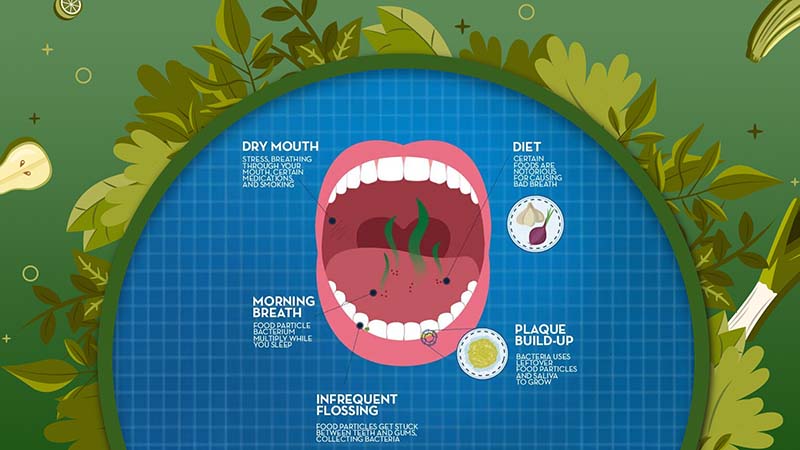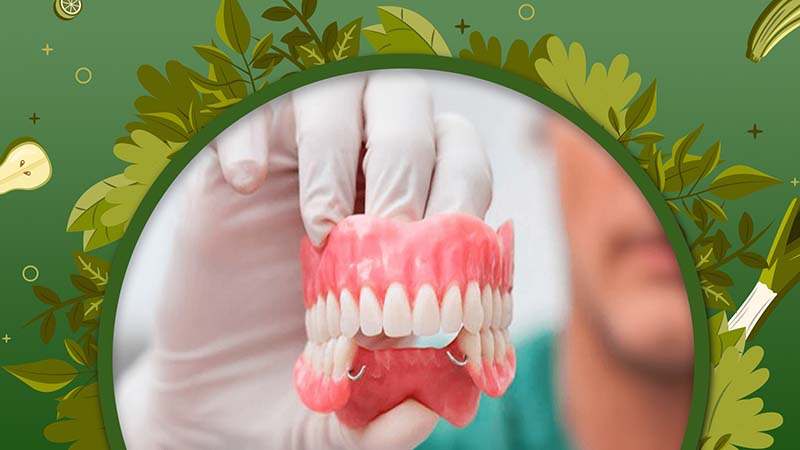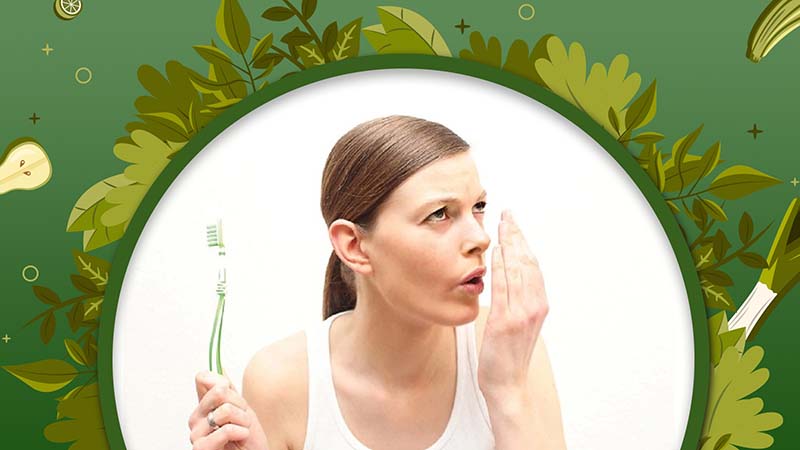Dental Health
Bad Breath from Saliva: Causes and Effective Treatments
It’s not easy to self-detect if one’s own saliva has a foul smell. This phenomenon is quite diverse, requiring the identification of individual causes for each person. However, most of us will experience unpleasant saliva when we wake up. Many people suffer from salivary gland inflammation, which results in a bad smell, while others acquire the smell from food and just need thorough cleaning for the smell to disappear. So, what exactly causes foul-smelling saliva, also known as bad breath from saliva, and how can it be treated? Let’s explore these questions in this article with Scham-online.de!

1. Causes of Foul-Smelling Saliva
Foul-smelling saliva can occur for various reasons. It could simply be due to improper oral hygiene or the smell of food. It could also be due to inflammation of the salivary glands or even a symptom of other serious diseases within the body, which can lead to bad breath from saliva.
You are the one who understands your lifestyle and habits the best, so as soon as you notice your saliva has a foul smell for a while, it’s important to self-reflect to identify the cause. Here are the most common reasons that many people encounter, which you may find helpful.

1.1 Poor Oral Hygiene
We cannot have fresh breath if we do not rinse our mouth and brush our teeth every morning. During the long hours of the night, bacteria can easily multiply and produce a foul smell. Therefore, brushing your teeth every morning is an important task to eliminate odor-causing bacteria, stimulate the taste buds, and enhance the taste of food.
Saliva can smell bad when leftover food particles are not cleaned and remain stuck in the teeth. Bacteria decompose this food, causing it to mix with the saliva being secreted. When you talk, an unpleasant smell can be detected by the person you are speaking to. Therefore, we should use dental floss to thoroughly clean leftover food after eating.
1.2 Consuming Foods with a Strong Smell
When drinking green tea, eating fresh ginger, or consuming raw vegetables, your breath smells fresh. However, foods like shrimp paste can give your mouth a distinctive smell. When you talk, it’s easy to identify what you’ve just eaten. However, this phenomenon is not too worrisome as it does not harm the body’s health. After eating, you just need to brush your teeth thoroughly, and your breath will be fresh again.
1.3 Wearing Dentures or Removable Dental Appliances
Dentures and removable dental appliances serve to improve chewing. However, if not used properly, leftover food can stick to them and cause bad-smelling saliva. Therefore, it’s necessary to clean dentures and removable dental appliances thoroughly using specialized cleaning solutions. If you find that the size of the denture or appliance does not fit you, it should be adjusted to avoid damaging the mucous membrane and gums.

1.4 Aging
As we age, the process of aging spares no one. This affects the health of our teeth and mouth to some extent. Our immune system weakens, making it less effective in combating harmful agents from the outside. Therefore, the aging of the salivary glands also becomes less efficient, slowing down the production and secretion of saliva.
At this point, the mouth often becomes dry, giving bacteria the opportunity to proliferate and cause foul-smelling saliva in the oral cavity. Moreover, this phenomenon also occurs similarly in people who drink little water or frequently use medicinal products.
1.5 Oral Diseases
All oral diseases have the potential to make the saliva and breath of the patient smell bad to varying degrees. Commonly, deep black cavities, severe gum inflammation, pulpitis, dental abscesses, or excessive dental plaque are all culprits causing bad smell in the oral cavity and saliva. Especially, gum inflammation with bleeding and pus discharge is even worse.
As a result, the saliva has a rancid smell of pus and blood being secreted. The sense of taste is also affected by these substances. Patients will feel a slight bitterness at the tip of the tongue and lose their appetite when eating daily. Inflamed gums when wisdom teeth erupt create a pocket for food to stick to. It’s very difficult to clean all the leftover food in this pocket. Therefore, bacteria decompose the protein in the food, creating a smell for the saliva. Typically, inflamed gums usually appear from 18 to 28 years old, corresponding to the period when the 8th tooth erupts after other permanent teeth.
1.6 Digestive Diseases
The digestive system also affects the health of the teeth and mouth to some extent, which is an obvious fact that few people pay attention to. Accordingly, individuals with respiratory diseases or gastroesophageal reflux disease will have bad breath from saliva along with it. The cause is due to food, gastric juice, and stomach acid escaping out through the mouth, making the saliva smell bad.

1.7 Respiratory Diseases
Similar to the digestive system, the respiratory system also has a direct impact on the breath, teeth, mouth, and saliva of the patient. Individuals with sinusitis, sinusitis, bronchitis, tonsillitis, pharyngitis, chronic lung infection, lung cancer also make the breath and saliva have an unpleasant smell. No matter how well you clean your teeth and mouth, you cannot avoid this bad smell.
2. Effective Solutions for Foul-Smelling Saliva
As we can see, the causes of bad breath are quite complex. Sometimes, even dentists may find it challenging to diagnose and propose suitable treatment plans based solely on the patient’s description.
Here are some suggestions on how to effectively handle foul-smelling saliva that you can apply immediately if you don’t have time to visit a doctor:
Ensure you consume at least 2 liters of water each day, even when you’re not thirsty. This is especially important for those who frequently engage in physical activities.
Use medication to increase saliva production to reduce dry mouth and bad breath. You can temporarily deal with foul-smelling saliva by chewing gum, using breath fresheners, or using peppermint oil,…
Use home remedies for bad breath with cinnamon, green tea, chamomile,… During the time when your saliva has a foul smell, you should use foods or products that have a scent.

2.1 Treating Tooth Decay
Immediately address any cavities or restore the shape of chipped, damaged teeth. Regain the natural color and chewing function of the teeth with the method of filling or sealing tooth decay.
2.2 Treating Gum Inflammation
The dentist will clean the teeth, perform oral hygiene with specialized tools such as dental scaling, water flossing, or treat with medication if necessary. Simultaneously, they will instruct patients on better oral care and hygiene, helping to maintain healthy teeth and eliminate the risk of severe progression to pulpitis or dangerous periodontitis.
2.3 Regular Dental Scaling and Polishing to Remove Plaque
Clean plaque, scale teeth to remove favorable conditions for bacteria to develop in the oral cavity. Besides, it also prevents them from invading the gum tissue, causing infection and bad breath for patients.
3. Conclusion
Above are some shared information about the causes and solution bad breath from saliva, that we want to send to readers for reference. We hope that the article has provided the most useful knowledge, fully answered the questions you are looking for, and thereby, you have a method to protect your teeth better.
